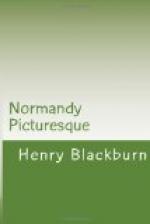But we are in a land where we are taught, not only to pray for our wants, but to pay for their expression; so let us not question the motive of the procession, but follow it again in the evening, into the town, where it becomes lost in the crowded streets—so crowded that we cannot see more than the heads of the people; but the line is marked above them by a stream of sunset, which turns the dust-particles above their heads into a golden fringe. They make a halt in the square and sing the ‘Angelus,’ and then enter the cathedral, where the priest offers up a prayer—a prayer which we would interpret—not for rain, if drought be best, but rather for help and strength to fight the battle of life in the noblest way.
Such scenes may still be witnessed in Normandy (although, of course, becoming less primitive and characteristic every year) by those who are not compelled to hurry through the land.
In the country districts the habits of the peasant class are the only ones that a traveller has any opportunity of observing; of the upper classes he will see nothing, and of their domestic life obtain no idea whatever. It is not to be accomplished, en passant, in Normandy, any more than in Vienna. In the inns, the company at the public table consists almost invariably of French commercial travellers, and the two English ladies whom we meet with everywhere, travelling together. There is hardly an hotel in Normandy, excepting, of course, at the watering-places (of which we shall speak in the last chapter), that would be considered well appointed, according to modern notions of comfort and convenience. Ladies travelling alone would certainly find themselves better accommodated in Switzerland or in the Pyrenees; excepting in the matter of expense, for Normandy is still one of the cheapest parts of Europe to travel in—the Russians and Americans not having yet come.
We meet, as we have said, but few French people above the farming and commercial class; our fellow-travellers being generally ‘unprotected’ Englishwomen who may be seen in summer-time at the various railway stations—fighting their way to the front in the battle of the ‘bagages,’ and speaking French to the officials with a grammatical fervour, and energy, which is wonderful to contemplate[56]—taking their places on the top of a diligence, amongst fowls and cheeses, with the heroic self sacrifice that would be required to mount a barricade; in short, placing themselves continually (and unnecessarily, it must be admitted) in positions inconsistent with English notions of propriety, and exposing themselves, for pleasure’s sake, to more roughness and rudeness than is good for their sex. These things arise sometimes from necessity—on which we have not a word to say—but more frequently from a rigid determination to ‘economize,’ in a way that they would not dream of doing at home.
We would certainly suggest that English ladies should not elect to travel by the diligences, and in out-of-the-way places, unattended; and that they had better not attempt to ‘rough it’ in Normandy, if they are able (by staying at home) to avoid the concussion.




